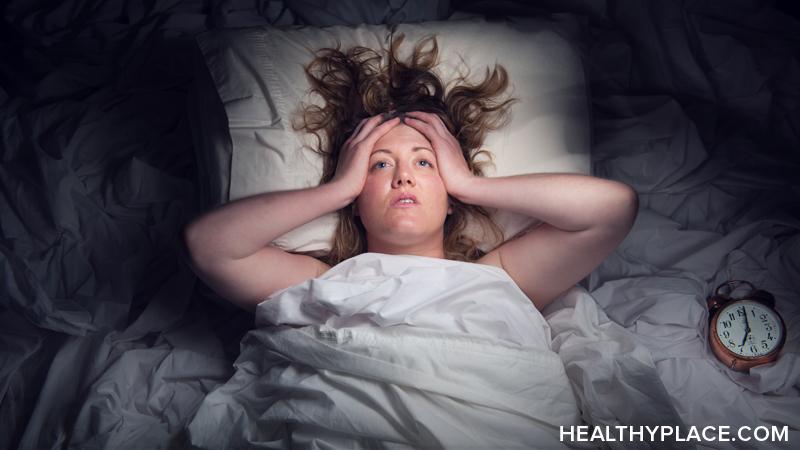Solutions for Bipolar and Insomnia: I Can’t Sleep

It’s common for those with bipolar disorder to experience insomnia and other sleeping problems, whether or not their mood episodes are being successfully treated with medication. When a person with bipolar can’t sleep, it’s very important to get treatment as sleep disturbances can lead to a decrease in functioning and an unstable mood. In fact, sleep disturbances have even been linked to suicidal feelings. And, of course, if this insomnia is chronic, then so is the mood disruption. If you have bipolar and aren’t sleeping, read on.
Non-Medication Approaches to Bipolar Insomnia Reduction
While insomnia medication for those with bipolar is available, a non-medication approach to bipolar insomnia treatment is often worth trying first as it has no risk of side effects or of being habit-forming.
The primary non-medication approach to the treatment of insomnia in bipolar disorder is called cognitive behavioral therapy for insomnia (CBT-I) and it involves:
- Analysis and goal-setting
- Motivational interviewing
- Sleep education
- Challenging behaviors and thoughts
Bipolar and Insomnia Analysis and Goal-Setting
This is the first step in dealing with insomnia. It involves asking questions of the patient to assess what he or she are doing that may be contributing to sleep disturbances. Questions center around:
- Routines before bed
- Nighttime contributors (such as leaving a cell phone on)
- Behaviors during the day (such as caffeine intake)
- Thoughts and emotions about sleep
Goals regarding improving sleep are then identified.
Motivational Interviewing for Bipolar Insomnia
Once the above are ascertained, a discussion of the pros and cons of changing behaviors, thoughts and emotions are weighed. For example, if a person leaves his or her cell phone on at night, that person will be asked if the advantages of changing that behavior are worth it.
Sleep and Circadian Rhythm Education to Improve Lack of Sleep in Bipolar
One of the issues people have with sleep is that they don’t know enough about how it works to optimize their experiences with it. This phase of the treatment for sleep deprivation focuses on education about how things like environmental factors, social rhythms and sleep times affect one’s quality of sleep.
For example, while people tend to like going to bed and waking up at different times (especially on the weekends as compared to the weekdays), people learn that this actually increases the risk of insomnia.
Bipolar Insomnia Treatment Through Cognitive Behavioral Therapy for Insomnia
The above steps are a prelude to CBT-I. As the name suggests, this type of therapy focuses on both behavior and cognitive changes.
Behavioral changes include:
- Stimulus control – focuses on making the sleep-wake cycle consistent and strengthening associations between the bed and sleep.
- Restricting time in bed – excessive time in bed actually increases the risk of insomnia so it’s better to be in bed only when sleeping.
- Regularizing sleep and wake times – going to bed at the same time and getting up at the same time every day may be the most important part of insomnia treatment. This creates sleepiness in the evenings, particularly when naps are avoided.
- Creating a wind-down routine – it’s critical to have 30-60 minutes at the end of the day to do sleep-promoting activities in dim light to help signal to the body that it’s time to sleep. Electronic devices need to be avoided.
- Initiating wake-up activities – this includes: not hitting the snooze button, opening the curtains upon waking and spending 30-60 minutes in bright light upon waking, among other things.
When changing behaviors around sleep it’s always important to watch for hypomania, mania or rapid cycling symptoms
When changing thoughts and feelings around sleep, the cognitive portion of CBT-I, the main goal is to reduce bedtime worry, rumination, and vigilance. This is done through techniques like:
- Therapy
- Diary writing
- Scheduling a limited “worry time”
Cognitive behavioral therapy for insomnia may seem complicated but it can be very effective and have long-lasting results.
Bipolar Insomnia Medication
The above behavioral and cognitive alterations used to treat insomnia are often preferred by patients as there is no risk of addiction. However, sometimes bipolar insomnia medication is needed. For more on sleep medication, see Bipolar Disorder and Sleep Problems: What to Do.
APA Reference
Tracy, N.
(2021, December 28). Solutions for Bipolar and Insomnia: I Can’t Sleep, HealthyPlace. Retrieved
on 2026, January 20 from https://www.healthyplace.com/self-help/bipolar-disorder/solutions-for-bipolar-and-insomnia-i-can-t-sleep



